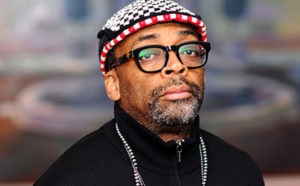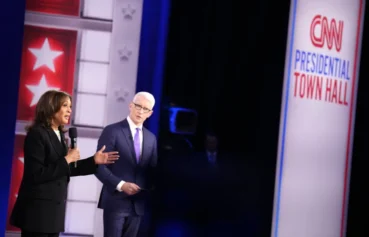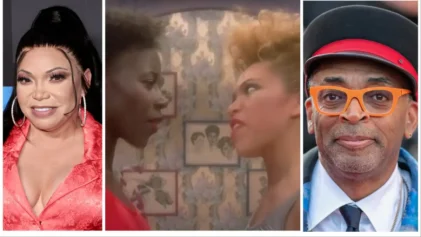
Lee decried the insensitivities that many whites bring along with them when they gentrify a previously poor and Black neighborhood. He called it the “Christopher Columbus Syndrome,” describing whites who act like they are the first inhabitants of the neighborhood. His comments spread across social media like a forest fire and prompted a national discussions about the effects of gentrification.
“You can’t discover this! We been here,” Lee said on Tuesday at Pratt when he was asked about “the other side” of the gentrification debate, an issue that had been raised in recent articles in the New York Times and New York magazine. “You just can’t come and bogart. There were brothers playing motherf***** African drums in Mount Morris Park for 40 years and now they can’t do it anymore because the new inhabitants said the drums are loud. My father’s a great jazz musician. He bought a house in 19 motherf***** 68, and the mother***** people moved in last year and called the cops on my father. He’s not — he doesn’t even play electric bass! It’s acoustic! We bought the motherf***** house in nineteen-sixty-motherfuckin’-eight and now you call the cops? In 2013? Get … outta here!”
On Wednesday, Lee told “Anderson Cooper 360” that he’s not against new people moving into areas that were once predominantly poor and predominantly African-American.
“My problem is that when you move into a neighborhood, have some respect for the history, for the culture,” Lee said.
This is how he said it in his talk at Pratt Institute on Tuesday night.
“You can’t just come in the neighborhood and start bogarting and say, like you’re Columbus and kill off the Native Americans,” he said. “Or what they do in Brazil, what they did to the indigenous people. You have to come with respect. There’s a code. There’s people.”
“And why does it take an influx of white New Yorkers in the south Bronx, in Harlem, in Bed-Stuy, in Crown Heights for the facilities to get better?” he continued. “The garbage wasn’t picked up every day when I was living in 165 Washington Park. P.S. 20 was not good. P.S. 11. Rothschild 294. The police weren’t around. When you see white mothers pushing their babies in strollers, 3 o’clock in the morning on 125th Street, that must tell you something.”
But as far as Lee’s diatribe, Mitchell Moss, a professor of urban policy and planning at New York University’s Wagner School of Public Service, would have none of it. Moss told CNN that New York has seen an enormous recovery since 2001. He said the greatest change has been in Brooklyn, which has drawn newcomers because of its housing, access to Manhattan and improved safety.
“Cities don’t stand still, and the cities that stand still are Detroit,” Moss said. “So if Spike Lee wants to see a place where there is no gentrification, he’ll also find a place where there are no investments. Obviously, he’s someone who knows how to make a movie but doesn’t know anything about cities.”
“Brooklyn has become more attractive to more people,” he added. “Of course, that means some people are going to have to find other places to live, but that’s the magic of New York. We create new places. Today, Bushwick, which was an area that people were afraid to go to, now has some of the best restaurants in the city.”
The New York Times investigated Lee’s claims about his father’s music and found that police have received 17 noise complaints—most of them from a woman who lived next door. This is a prime example of Lee’s point—a woman not even aware that the music was coming from a man who is not only a treasured institution in Brooklyn, but also a national treasure.
In his interview with Anderson Cooper, Lee didn’t dispute that gentrification raises home prices, but he wondered what happened to the people who are priced out of the neighborhood.
“There’s good. But what cost? If we lose half of the African-American population, in my neighborhood, Fort Greene, and the schools become better, what happened to half the people that left?” he said.
“I just find it interesting you have to have an influx of white New Yorkers to move into these neighborhoods for the services to go up, for the schools to be better,” he told CNN. “They get better sanitation, get more police protection. Why didn’t that happen before gentrification? We’re still paying taxes. We’re still New Yorkers.”


